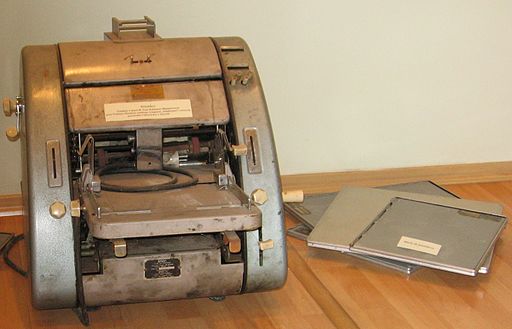What would today's society do in a non-electrified world? Oh, some would cope, but I expect most of those would be the older crowd - those who understand how to live without cell phones and internet, or instant everything. Consider just how much of our life is dependant on electricity. Fridges, stoves, cookers of several types, coffee pots, hot water, radio and TV, lights, education, workplaces ... today, nearly all of them depend on power (okay, there are some appliances that run off gas or propane but just as many homes run electric appliances).
 |
| Ditto Machine (Wikimedia) |
I recognized it immediately because in our high school's office (back in the 1970s) sat the exact same model, and I used to have to "work" in our high school office on my lunch hour. In our business dept (that's where students learned stuff like typing and Short Hand and general office stuff they had a "Ditto" machine (a little different than the Gestetner) ... I used to run that one too, and type up lessons to run off.
 |
| Overhead Projector (Wikimedia) |
I often wonder how today's students would fare under such a system. I think some would be fine, while others would be totally lost, and fidget so much they'd distract everyone else. I think even some adults would be lost.
 |
| Melitta Coffee Pot (Wikimedia) |
 During the 3-day powerless period we managed okay, but then, we were old people and understood how to do it. I had a lot of old kitchen gadgets...I mean really old (1900-1930s) and not a single one of them had a power cord. I had everything I needed to cook with except a stove and oven, but we did have a BBQ. We could even make toast, because I had an old campfire toaster and an old Melitta Coffee pot (that only required a paper filter ... or in a pinch paper towel folded into a cone shape, coffee grounds, and boiling water ... that came from a pot on the BBQ). We ate a lot of food that didn't require cooking - had to use that up first (things that were perishable) and then started cooking meat over the BBQ.
During the 3-day powerless period we managed okay, but then, we were old people and understood how to do it. I had a lot of old kitchen gadgets...I mean really old (1900-1930s) and not a single one of them had a power cord. I had everything I needed to cook with except a stove and oven, but we did have a BBQ. We could even make toast, because I had an old campfire toaster and an old Melitta Coffee pot (that only required a paper filter ... or in a pinch paper towel folded into a cone shape, coffee grounds, and boiling water ... that came from a pot on the BBQ). We ate a lot of food that didn't require cooking - had to use that up first (things that were perishable) and then started cooking meat over the BBQ.I had an old battery operated radio of my dad's so we at least could get
 |
| My dad's old battery radio. |
The biggest worry was keeping things cold - both in the freezer, and the milk. We packed the freezer and fridge with ice, but not until the second day. A closed freezer will stay pretty frozen for at least 24 hours if you don't keep opening it. After that you either need to find a way to keep it frozen, or cook the meat. Unfortunately, it was August, and hot. And, nobody was really prepared for a 3-day hiatus from ordinary life. Initially there was a run on stores for generators ... you couldn't buy a generator within 500 miles of here, and then the same happened for ice ... and then the staples. Most of the stores were closed (no backup power) and of course with all the registers being scanners and needing electricity, well, some people just had a 3-day work break.
 |
| Cash Registers (via morgueFile.com) |
It makes me wonder sometimes if all the progress we have happening today is really such a good thing ... I mean, I do agree that progress is necessary but not at the expense of losing our ability to survive without all the gadgets. Why can't both technologies exist together?
What would happen without cell phones? Do people still know how to communicate face-to-face, and not by tapping things on a little screen? What would happen without the internet? Would people still read printed newspapers; would they know how use the library?; would they get lost, or understand how to read a paper map? How about looking up a word in the dictionary ... paper books won't take you directly to the word, you have to know somewhat how to spell it. (Actually, I still do all of the above ... as a reigning dinosaur, I don't rely on gadgets ... yep, they're fun, but I get my newspaper in my front door, not on my computer or phone. My main phone plugs into the wall, not into the car.)
Seems a little overboard, but it's not. I saw my own kids struggling to use a printed dictionary in school, and that was before all this modernization. They didn't know how to use a card catalogue at the library either.
What if you couldn't access your Paypal account, or your virtual banking system, or get money from the ATM anytime of night or day?
In our town, and I bet across most of the eastern provinces and some of the eastern US, that summer, during those dark, quiet 3 days, a lot of people learned to do things they never knew how to do before.
Three days was tough enough for a lot of people, but what if ... what if it was three months, or three years? Could you do it? Could your kids do it? As a society, could we do it? There's where you make it or break it ... it takes everyone working together, using their skills and their supplies and sharing just about everything to get through a serious crisis.
Something we all need to think about, because nothing is 100% for certain, except (as they say) death and taxes.



No comments:
Post a Comment